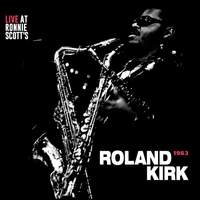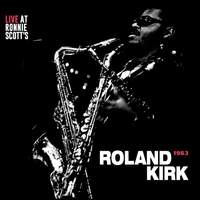Recommended New Release,
Rahsaan Roland Kirk, 'Live at Ronnie Scott's 1963'

When it comes to recognisable jazz players you can hardly get more idiosyncratic than Rahsaan Roland Kirk, sometimes simply known as Roland Kirk; if you’ve ever looked him up online you’ll no doubt have seen some brilliant photographs of him with a handful of instruments slung around his neck, often even playing multiple ones at once. Kirk was no novelty act though, and was just as much a capable player as his contemporaries even if he remained something of an outsider artist during his lifetime. Kirk would arguably never put out a bad record during the entirety of his 22 year career – Matt and myself have both talked at length about Kirk in the past, check out our write-ups on I Talk With the Spirits and Volunteered Slavery.
A player of many reed instruments as well as the flute, Kirk pushed all of his instruments to their limits with his use of extended techniques and raw chops. Kirk endured much during his lifetime, from an early age contending with both blindness and the Black American experience, and after having played for two decades he suffered a stroke which left him paralysed on one side of his body in 1975. But, much like how racism and blindness hadn’t stopped his musical endeavours before, Kirk found a way by modifying his instruments to be played with just one hand for the final two years of his life.

This particular recording, as the title suggests, took place at Ronnie Scott’s jazz club in London, a popular spot for jazz musicians which also provided the space for multiple other live albums, including those by the likes of Nina Simone, Chet Baker, Ella Fitzgerald and Curtis Mayfield. Kirk’s backing band for Live at Ronnie Scott’s is something of a rarity, consisting of three British jazz musicians rather than his usual troupe of players; pianist Stan Tracey, bassist Malcolm Cecil and drummer Ronnie Stephenson, and you’d be forgiven for forgetting that Kirk is the only reedist on this album given his unmistakable dual-instrument playing that he employs throughout the record.
The quartet play four cuts at roughly 10 minutes each with extended soloing – mostly from Kirk – filling in much of the runtime, including the only known recording by Kirk of Duke Ellington’s ‘Angelica’ and some pure madness on the flute solo on the closing track ‘Three for the Festival’ which has Kirk over-blowing his flute so much he’s practically blowing raspberries into the microphone. Kirk also utilises the same percussive elements of the flute like on I Talk With the Spirits as well as heavily vocalising the notes he’s playing – if anything says ‘Roland Kirk’ on this recording it’s easily this closing track.
This ‘previously unreleased’ recording was actually made available earlier in the year as part of Record Store Day, but if you missed the drop this reissue from Gearbox features the very same high-quality presentation, and even an extra obi slip which anyone who’s ever purchased Japanese records before will be familiar with. In any case, Live at Ronnie Scott’s 1963 will make for an excellent addition to any ‘Kirk collection when it drops next month, so be sure to keep an eye out.
Live at Ronnie Scott’s 1963 releases next month on CD, vinyl and digital download…
Available Format: CD
Available Format: Vinyl Record





